Download a copy of the
Degree Outcomes Statement 2023
The UK Standing Committee for Quality Assessment (UKSCQA) expects Higher Education providers to periodically publish a Degree Outcomes Statement analysing their institutional undergraduate degree classification profile and articulating the results of an internal institutional review. For further information on Degree Outcomes Statements, please see the UKSCQA’s publication Degree Classification Transparency, Reliability and Fairness - A Statement of Intent.
The publication of Degree Outcomes Statements forms part of a sector-wide commitment to protecting the value and credibility of undergraduate Higher Education qualifications, and the degree classifications system that underpins them, in the interests of students - past, present and future. The University’s approach includes viewing degree outcomes through the dual lenses of supporting 'Success for All', a major strand of the University’s Education Strategy, and ensuring the integrity of Exeter degrees,
At the University of Exeter, the internal institutional review of degree outcomes and the preparation of the Degree Outcomes Statement is overseen by the Degree Outcomes Steering Group. This group, which includes student representatives, pursues a multidisciplinary and collaborative approach to the collation, presentation, analysis and monitoring of degree outcomes data. This remit of the Steering Group is to be expanded in 2023/24 to look at student outcomes across the student journey from first year through to graduate-level employment or post-graduate study.
In accordance with the UKSCQA expectation, the University has now published its fourth Degree Outcomes Statement covering the five academic years up to and including 2021/22. This may be viewed by expanding the sections below or clicking on the PDF in the right-hand bar, which also includes two, more focused reports on:
- The 2019/20 No Detriment Policy implemented at the University in response to the COVID-19 Pandemic and its impact on degree outcomes; and
- The University’s response to the Universities UK and Guild HE commitments on protecting degree standards.
Prior to publication, the Degree Outcomes Statement itself and any Supplemental Reports, together with the outcomes of the internal institutional review, are scrutinised by a range of University governance bodies and approved by Council and the University Principal External Examiner.
The University of Exeter is an autonomous Higher Education provider holding university title and degree awarding powers under the Higher Education and Research Act 2017. This autonomy means that the University is responsible for setting and maintaining the academic standards and quality of its undergraduate degrees and other qualifications. It does this within the context of the academic regulations and ordinances of its Council, and in accordance with the policies, procedures, frameworks, codes of good practice and guidance set out within its Teaching Quality Assurance Manual (TQA).
The purpose of this statement is, therefore, to present prospective and current undergraduate students, academic partners, stakeholders and other interested parties with information, and thus assurance, on how the University monitors and manages the academic standards of its undergraduate awards at Levels 4-6 of the Frameworks for Higher Education Qualifications of UK Degree-Awarding Bodies, as incorporated into the Regulatory framework for higher education in England, and in accordance with Conditions B4 and B5 of its registration with the Office for Students (OfS).
The statement also aims to meet the expectations of the UK Standing Committee on Quality Assessment (UKSCQA) Statement of Intent, and associated principles and guidance, thereby ensuring transparency, reliability and fairness in relation to degree outcomes for all University of Exeter students, whatever their background or journey to, and through, Higher Education. It, therefore, highlights both degree awarding trends and degree awarding gaps between different demographic groups of students, and the University’s respective responses.
Previous Degree Outcomes Statements and the Supplemental Reports to the Degree Outcomes Statements 2021 and 2022, provide further context and information on the University’s degree outcomes data over time and its ongoing work to ensure success for all and maintain the integrity of its awards.
2.1 Trends in Undergraduate Degree Classifications
This section presents trends in the classifications of degrees awarded by the University to all its undergraduate students between 2017/18 and 2021/22. This includes UK-domiciled and international students. The data is presented as the percentage, or proportion, of different degree classifications awarded (1st, 2:1, 2:2 and 3rd). The focus is, however, primarily on the award of 1st class degrees, as a commonly used indicator of performance and change over time.
The data also includes Integrated Masters Degrees, which are four-year, Level 7 FHEQ programmes, predominantly in engineering, mathematics and sciences, which incorporate an honours degree. The results for students on the Bachelors of Medicine and Surgery (BMBS), who are not awarded traditional degree classifications, have been excluded from the data. The degree stage attainment data for this group of students is, however, internally reviewed and responded to.
Figure 1: University of Exeter Trends in Undergraduate Degree Classifications
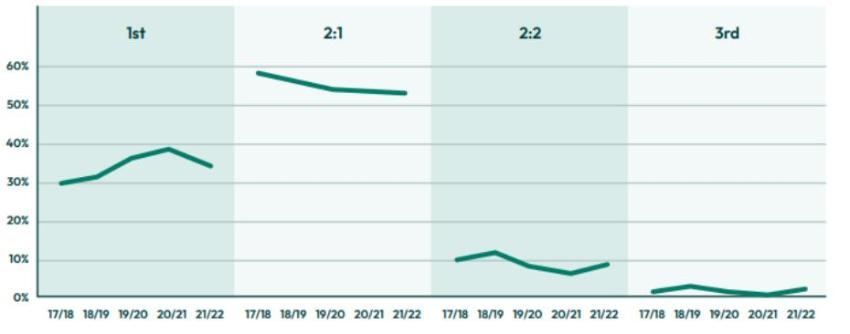
Over the past five years, the trend in the proportion of 1st class degrees awarded by the University has fluctuated , with associated changes in the award of 2:1s and in lower class degrees. Prior to 2019/20, the award of 1st class degrees had largely stablised at around 30-31%, however, during the COVID-19 pandemic impacted academic years the award of 1st class degrees increased by 6% to 37% in 2019/20 and then by a further 1% to 38% in 2020/21. In 2021/22, the award of 1st class degrees decreased by 2% to 36%, beginning the return to pre-pandemic levels.
This section presents the trends illustrated in Section 2 above, in comparison with the same trends for the following groups within the Higher Education sector:
- The Sector – all undergraduate degree awarding institutions;
- The Russell Group – a group of research-intensive Universities, of which the University of Exeter is part; and
- The Competitor Group – a self-selected group of similar institutions within the sector.
The data is drawn from the Higher Education Statistics Agency (HESA) Student Outcomes Data Set for the five academic years up to and including 2021/22 as collated and supplied by Jisc (formally the Joint Information Systems Committee, now a not-for-profit member organisation) and is used for benchmarking purposes.
Figure 2: Comparison of University of Exeter Trends in Degree Classification with the Higher Education Sector
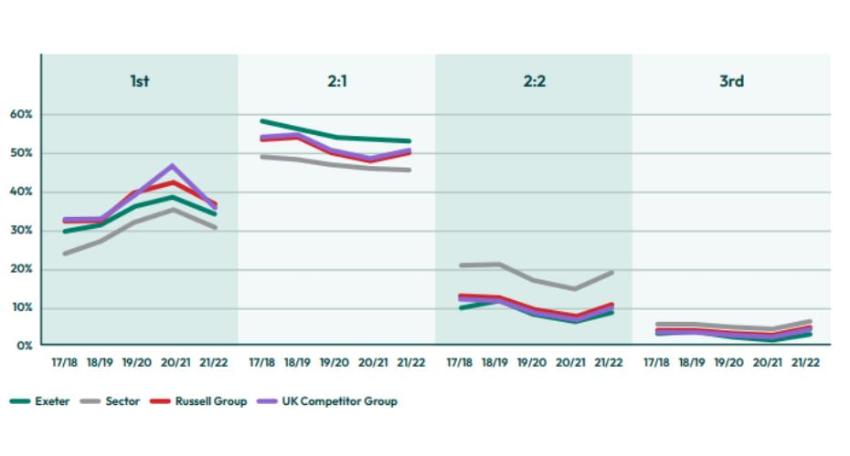
Over the past five years, the University’s trends in the award of 1st class degrees have been reasonably well aligned with those found across the Russell Group, its Competitor Group and the Sector as a whole. This includes the increase during the COVID-19 pandemic impacted academic years or 2019/20 and 2020/21 and subsequent decrease in 202122.
The main areas of difference in respect of the award of 1st class degrees are as follows:
- The University’s award of 1st class degrees, whilst following a similar pattern, continues to be lower than the Russell Group, at 36% (Exeter) and 38% (Russell Group) respectively in 2021/22.
- The University’s award of 1st class degrees continues to be higher than the Sector as a whole, at 36% (Exeter) and 32% (Sector) respectively in 2021/22.
- The University’s award of 1st class degrees peaked much lower than its Competitor Group in 2020/21, at 38% (Exeter) and 46% (Competitor Group) respectively, with the latter experiencing a sharper decrease in 2021/22, to 37% compared to the University’s 36%.
This section presents trends in the 1st class degrees awarded by the University to its undergraduate students between 2017/18 and 2021/22, differentiated by selected demographic groups. This aims to highlight awarding gaps, that is the difference in 1st class degrees awarded to different groups of students.
Figure 3: University Exeter Proportion of 1st Class Degrees by Domicile
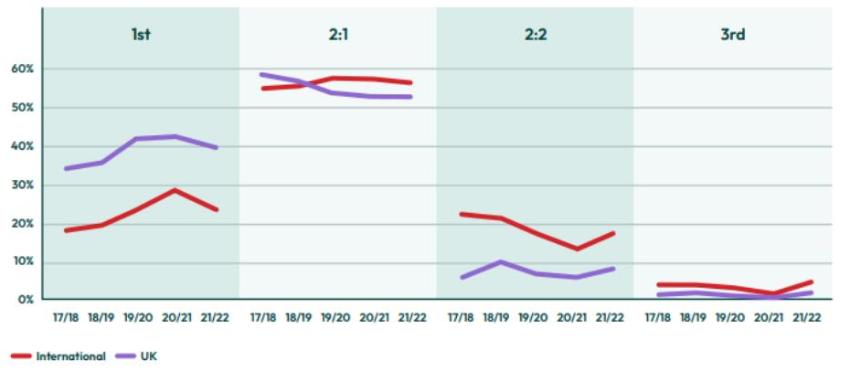
Figure 4: University Exeter Proportion of 1st Class Degrees by Age Group
-850x401.jpg)
Figure 5: University Exeter Proportion of 1st Class Degrees by Disability
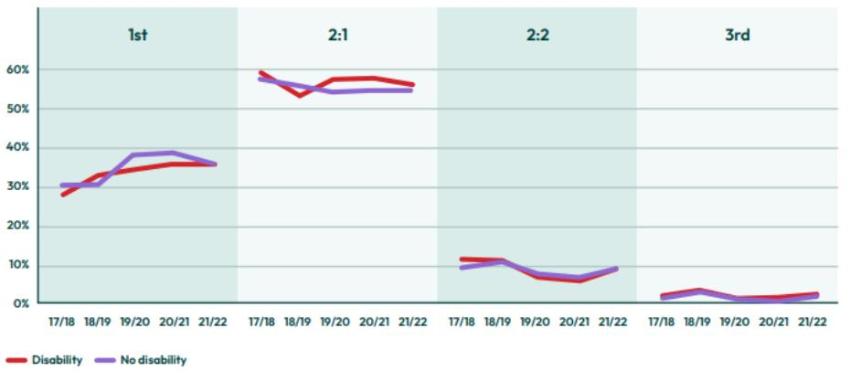
Figure 6: University Exeter Proportion of 1st Class Degrees by Gender
-850x381.jpg)
Figure 7: University Exeter Proportion of 1st Class Degrees by Young Participation in Higher Education
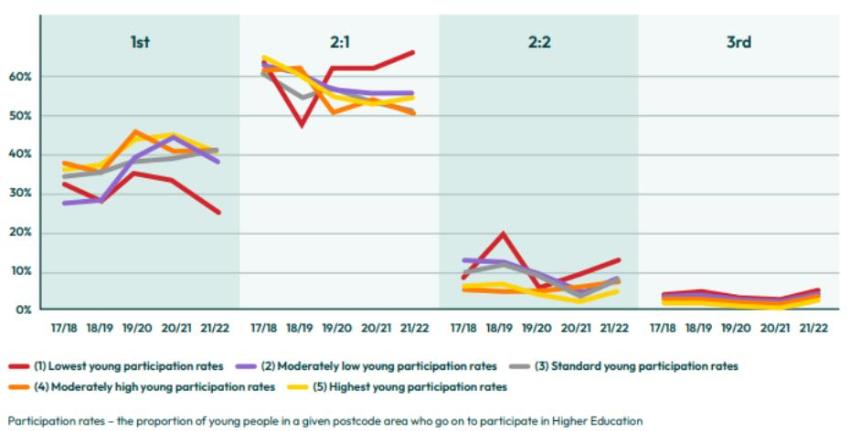
Figure 8: University of Exeter Proportion of 1st Class Degrees by Ethnicity
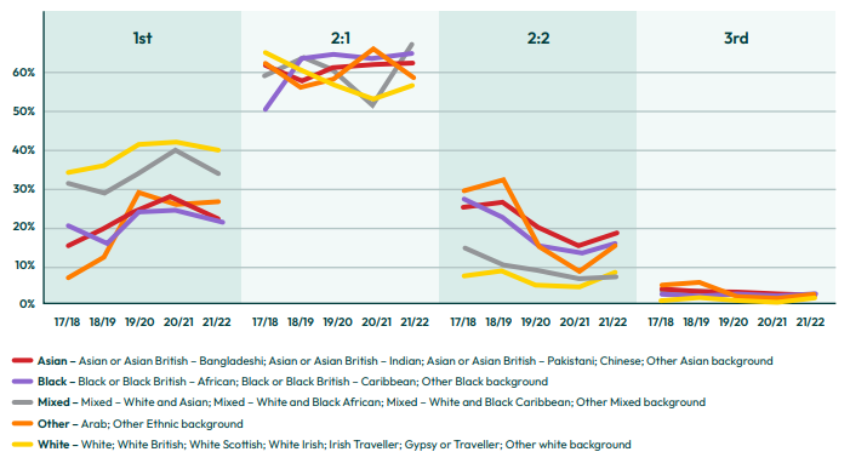
Contributions to the improvement in student performance and awards between 2017/18 and 2021/22 include: (i) sustained improvements over time in the entry standards of students; (ii) the development of new educational facilities and resources; and (iii) the paninstitutional focus on enhancement of teaching, learning and assessment practices. As the impact of (ii) and (iii) has not been isolated, there may be an element of what the OfS define as unexplained change, that is: ‘…change over a time period that cannot be accounted for by change in the characteristics of the graduating cohort’1 .
The University is confident that its commitment to excellence in teaching and learning, alongside investment in educational facilities, resources and support services has had a positive impact on academic outcomes for its students over time. However, there is a need for more definitive evidence to establish a clear relationship between such factors and the increase in 1st class degrees awarded. The University continues, therefore, to undertake further research and analysis to better understand the multiple contributions to this increase.
Additional data held by the University indicates that there are differences in the degree awarding profiles of individual Faculties and between Departments within those Faculties. The University now undertakes an annual benchmarking activity comparing its own degree classification data with that from cognate disciplines across the Russell Group, Competitor Group and Sector as a whole. This data is also used by the Departments, their Assessment Progression and Awarding Committees (APACs) (see Section 3 below) and their External Examiners (see Section 3 below) to provide further assurance of degree standards.
The University recognises that awarding gaps exist between some of its demographic groups of students and it is committed to driving down and eliminating such gaps. These are defined by the OfS as ‘… identified gaps in degree outcomes for underrepresented groups when compared with their peers’2 . It should be noted that the data above relates to all undergraduate students at the University, including international students. There may, therefore, be some differences in the gaps shown above and those identified in the University’s Access and Participation Plan 20/21-24/25 (variation 23/24). This plan utilises data from the OfS’s publicly available Access and Participation Data Dashboard, which covers UKDomiciled students only.
Additional data held by the University indicates that there are also differences in the scale of awarding gaps shown between individual Faculties and between Departments within those Faculties. The University has, therefore, devised a methodology which analyses the development of awarding gaps over the course of the student journey for specific demographic groups and explores potential contributory factors. The analysis is undertaken at Department level and the outcomes are now made available on an annual basis facilitating Departmental reviews of awarding gaps and planning of response.
Addressing disparities in degree outcomes remains a top priority for the University, in particular, reducing the 1st class degree awarding gaps between students from Asian, Black, Mixed and Other (ABMO) ethnicities and white students. This is, therefore, an area in which the University is committed to, and engaged in, further research, analysis and action at both strategic and operational levels (see Section 7 below for further information).
[1] Analysis of degree classifications over time: Changes in graduate attainment from 2010/11 to 2020/21, OfS, 2022. Available at www.officeforstudents.org.uk/media/cd778d76-5810-488b-b1e6-6e57797fe755/ofs-202222.pdf
[2] Office for Students Access and Participation Glossary. Available at Access and participation glossary - Office for Students
The regulation of standards is set out in the University’s Assessment, Progression and Awarding: Taught Programmes Handbook. The University has a robust and rigorous approach to assuring the standardisation of assessment, marking and decision-making on the award of its degrees, confirmed through prior Quality Assurance Agency for Higher Education (QAA) Institutional Review and Institutional Audit. These have not changed significantly during the period covered by this statement. Consistency of marking is ensured through best practice quality and standards assurance measures, such as Anonymity (wherever possible) and the use of Moderation and Sampling. External Examiners are appointed to oversee the standards of assessment on all taught programmes, producing annual reports, which feed into the University’s quality and standards review processes.
The University operates a three-tier system of Assessment, Progression and Awarding Committees (APACs). Tier One is the Discipline APAC, whose primary responsibility is to safeguard academic standards.
Tier Two is the Faculty APAC, whose primary responsibility is to ensure that academic regulations are applied consistently and equitably across Departments within a Faculty. Tier Three is the University APAC, whose primary responsibility is to identify areas where policy clarifications or enhancements are required, consider patterns of degree outcomes and academic standards and make associated strategic recommendations.
To ensure that the University’s Assessment Criteria meet sector reference points, the QAA Subject Benchmark Statements and other Sector Standards are considered during the approval and review of programmes, together with the competency requirements of Professional, Statutory and Regulatory Bodies (PSRBs) where appropriate. External Assessors are also appointed during the approval process to ensure that academic standards and the quality of the student academic experience are assured from the outset. In addition, the University supports opportunities for academics to work as External Examiners and Advisors to enhance standardisation within the Higher Education sector.
The procedures governing student academic appeals against assessment, progression or awarding decisions are detailed in the University’s Student Cases Handbook. Students may also apply for Mitigation, the procedures for which are set out in Chapter 10 of the University’s Assessment, Progression and Awarding: Taught Programmes Handbook. This provides a ‘safety net’ in the event that a student is ill or affected by personal circumstances that potentially preclude them from undertaking an examination or submitting an assignment on time.
The Statutes and Ordinances of the University of Exeter are the fundamental rules and principles that govern how the University undertakes its learning and teaching. Detailed Regulations cover the operation of teaching, examinations and other matters relating to students. The Council is the University’s governing body, with responsibility for institutional policies and finances, estates and legal matters, including compliance with the quality and standards conditions of registration with the OfS. Academic governance is provided by Senate which is responsible for teaching and learning, examinations and research. The highlevel work of Council and Senate is supported through various committees and the Dual Assurance structure, which focuses on particular areas of the University’s activity, such as education and student experience.
The University has a well-established process of annual internal institutional review of its degree classification data, with the Business Intelligence Team preparing a detailed and extensive report on degree classifications over time, up to and including the preceding academic year in collaboration with the Quality and Standards Team (see Section 7 below for further details). The report and a supporting analytical commentary are presented to Senate, as the senior forum for academic staff, to shape academic strategy, scrutinise plans and raise issues of major strategic importance to the University. Senate ‘Deep Dives’ into degree outcomes are also held on a regular basis to explore issues and responses in more detail.
It is an expectation of the UKSCQA that governing bodies or academic senates should incorporate external assurance into their internal reviews of degree classifications and the preparation of their external Degree Outcomes Statements. The University’s Principal External Examiner was specifically appointed for this purpose and is fully engaged in the review of degree classifications and signs off the Degree Outcomes Statement, prior to publication. With a background and expertise in Social Mobility, Justice and Inequalities in Higher Education, they fulfil a dual role in reviewing degree outcomes from the perspective of degree standards and ‘Success for All’. In doing so, they attend meetings of the University APAC and Degree Outcomes Steering Group (see Section 7 below for further details).
Arrangements for teaching, learning and assessment delivered through partnership arrangements are outlined in the University’s Academic Partnerships Handbook and the Validated and Accredited Awards that may be delivered in partnership are listed in its Regulations.
Degree classification algorithms are the rules by which degree awarding bodies consistently determine the degree classification for individual final year undergraduate students. Algorithms may vary slightly from one university to another but are typically based on the weightings attributed to each stage or year of study and the final credit weighted mean mark achieved.
The University’s approach to determining undergraduate degree classifications may be found in Chapter 9 of its Assessment, Progression and Awarding: Taught Programmes Handbook. More specifically, the Rules for the Classification of Bachelor’s and Integrated Master’s Degrees are set out in Section 9.4. The degree algorithms are applied rigorously and consistently by Department APACs and verified by Faculty APACs. Any exceptions, such as Aegrotat Awards made under Ordinance 16, must be approved by the Dean for Taught Students at the University APAC.
To ensure that academic standards are upheld, there are consequences for failure in individual assessments and modules, and whilst referrals and repeat study, with and without attendance, are permitted within strict limits, the maximum grades that may be achieved are capped at the pass mark of 40%. Students may, however, apply for Mitigation, which if approved would permit them additional time or an additional opportunity to complete an assessment without penalty. Further information on the consequences of failure in assessment is available in Chapter 11 of the Assessment, Progression and Awarding: Taught Programmes Handbook.
The University prides itself on its commitment to excellence in all aspects of teaching, learning and assessment and consistently strives to enhance the quality of its teaching and learning. Dedicated teams of professional services experts work across the University to support academic staff in the development and delivery of teaching excellence for all its students.
The University’s Quality Review and Enhancement Framework sets out the process for the annual Quality Review and Enhancement of Taught Programmes. This is a multi-layered process starting with the Annual Review of Modules and culminating with the Annual Review of Faculties by the University. There are two elements within this, which focus specifically on teaching excellence and academic standards:
- Teaching Excellence Action Plans (TEAPs) have been designed to reflect the strategic importance of teaching excellence, respond to emerging issues and record completed actions, as part of a cyclical process of quality assurance and enhancement; and
- Teaching Excellence Monitoring Meetings (TEMs) are the annual University scrutiny meeting with each Department within the Faculties, which ensure that its expectations in relation to teaching and learning are being upheld and that best practice is highlighted and shared.
The University continues to develop its facilities and services to support its educational priorities, its teaching and learning and the academic experience of its students. Estate Services oversee the refurbishment of existing, and the provision of new, teaching and learning facilities and study places and spaces for students. This includes adapting such space to new ways of working and studying, post the COVID-19 pandemic, and to contribute to the University’s Net Zero by 2030 commitment. There is also considerable ongoing investment in Library resources and services for academic staff and students, both physical and online. A new version of the Exeter Learning Environment (ELE), has also been developed, providing students with enhanced access to teaching, learning and assessment materials online.
The University continues to take an evidenced-based approach to the enhancement of its teaching, learning and assessment practices ensuring that they are designed from the outset to have a positive impact on the learning experience and academic outcomes of its students. Monitoring and evaluation is also built into every stage of development and many improvements are co-created with, and reviewed by students through a well-established system of Academic Representation and close partnership working with the University of Exeter Students’ Guild (Exeter campuses) and the Falmouth and Exeter Students’ Union (Cornwall campuses).
7.1 Commitment to Success for All
The University’s Education Strategy 2019-2025 makes a commitment to ‘…delivering an education and student experience of the highest international quality, and to supporting all of its students to realise their potential’. This is also captured in its Access and Participation Plan 20/21-24/25 (variation 23/24) for UK-domiciled students only and in the University’s Strategy 2030.
One of the Education Strategy’s priorities is to, ‘enhance our undergraduate offer in: the quality of learning, teaching, student support and student outcomes’. The strategy also defines as a characteristic of excellence in education, ‘Success for all our students’, underpinned by a pledge to:
- Strive to eliminate gaps in access, awarding and progression to employment seen between groups defined by socio-economic (dis)advantage, ethnicity, age, disability, gender and nationality.
The University’s leadership and governance arrangements for the delivery of this pledge are overseen by the Success for All Strategy Group, chaired by the Deputy Vice-Chancellor (Education and Student Experience). The Strategy Group is supported by a series of working groups, each addressing a different aspect of the student lifecycle, including:
- Access;
- Transition and Induction;
- Success and Inclusive Education; and
- Progression.
Additional thematic working groups focus in on areas requiring actions and interventions for specific student groups, such as:
- International student experience;
- Underrepresented students; and
- Diversity and inclusion in postgraduate study.
Within the framework provided by the Success for All Governance Structure, the University of Exeter has adopted and is now delivering a three-strand approach to addressing awarding gaps between students from different demographic groups. This approach recognises the evidence-informed value of inclusive education, successful transitions and targeted interventions.
1. Systemic promotion and embedding of inclusive education practice
- Implementing a Transformative Education Framework with inclusive education, racial and social justice and sustainability as core strands.
- Utilising an on-line Education Toolkit which provides a wealth of information, tools and resources for academic staff to help them adopt inclusive approaches within their teaching and assessment practices.
- Using the Department-level TEAPs and TEMs, which form part of the Quality Review and Enhancement Framework, in tandem with Faculty Success for All Groups, to provide a framework for addressing awarding gaps at Department level.
2. Delivery of best practice approaches to induction and transition
- Implementing a structured transition process, based on best practice principles, starting prearrival, moving through the initial induction period and extending throughout students’ first term and beyond.
- Maintaining Transition and Induction Coordinator roles in each Faculty to support and share structured and consistent approaches to effective induction and transition across the University.
- Delivering a suite of on-line, Faculty-level prearrival courses. These provide students with an opportunity to introduce themselves and connect with their peers.
- Delivery of an Enhanced Induction Programme to provide extra support, signposting and access to peer networks to under-represented students to ensure they have the best possible start to their university studies.
3. Enhanced and targeted support for students, particularly those within groups most likely to experience gaps in outcomes
- Providing leadership via the Associate Dean for Taught Students (Racial Equality and Inclusion) and a network of Inclusion Academic Leads at Department-level to provide support for students who may experience racism or discrimination during the course of their studies.
- Continuing to provide a Peer Mentors scheme and using peer engagement to specifically support students from widening participation backgrounds, such as those disclosing physical or hidden disabilities, thereby providing personalised support.
- Prioritising the support provided by the Study Zone, which offers individualised academic skills development, for students from widening participation backgrounds and those groups most likely to experience degree awarding gaps.
- Enhancing the cross-university approach to monitoring and evaluating these schemes to better understand ‘what works’
Across the University, students, researchers, academics and professional services staff are also continuing to work collaboratively to create an inclusive learning environment, within which all can thrive and succeed.
This includes that undertaken by the sector-leading Centre for Social Mobility, the innovative Education Incubator, together with the student focused priorities of the Wellbeing, Inclusion and Culture Committee (WICC) co-chaired by the Provost and the Executive Divisional Director of Human Resources.
As outlined in Sections 3, 4 and 5 of this Statement, the University pursues a robust and rigorous approach to assuring the standardisation of its awards over time as set out in its Assessment, Progression and Awarding: Taught Programmes Handbook. Chapter 13 on the Review and Publication of Degree Outcomes is an integral part of this approach and provides a formal structure for both the internal review of degree classifications and the external publication of this Statement.
Data and information remain critical to the understanding and maintenance of degree standards, as well as action to eliminate degree awarding gaps. With specific reference to the former, the University’s Business Intelligence Teams and Quality and Standards Team continue to work collaboratively to develop curated reports and live dashboards, to support an annual cycle of informed decision-making and action on degree standards at operational and strategic levels, from Module Convenors to the Council of the University.
Examples of the University’s annual and curated reports and live dashboards include the following:
Degree Classification Summary Reports:
These present Institutional and Faculty data across five academic years highlighting trends in both undergraduate degree awarding patterns and awarding gaps between different groups of students. The reports support institutional decision-making on strategic actions and priorities and evaluation of the impact of policy change, in relation to both academic standards and ‘Success for All’. The associated review and reporting process has now been extended to cover postgraduate taught programmes.
Degree Outcomes Benchmarking Report:
This utilises HESA /Jisc degree classifications data to present comparisons of the University undergraduate degree classifications with the Russell Group, the University’s self-selected Competitor Group and the sector as a whole. It can be viewed at Institution, Faculty and cognate discipline levels. By informing dialogues about academic standards, the data supports decision-making on assessment design, marking practices and moderation. The report also presents opportunities for marking calibration activity between Departments within the same and different Faculties.
Module Results Reports:
These present historic module data compared to current module data to support decision-making at Department-level APACs, both for undergraduate and postgraduate taught modules. Academic staff and External Examiners will consider whether any Scaling of module marks should be undertaken, if the performance of a cohort of students shows a significant deviation when compared to previous academic years. Data is considered alongside other contextual factors, such as exceptional circumstances affecting all students in the cohort.
A current priority action for the University is to ensure that the available data and information is disseminated in a timely manner across the academic year to those that need it. An associated commitment is to provide support, such as through workshops and one to one advice, to assist both academic and professional services staff in accessing, interpreting and making effective use of the data and information to assure the academic integrity of awards for taught programmes.
In addition, the University is taking steps to share this Statement and its internal reports with module and programme-level External Examiners to assist them in undertaking their roles and responsibilities. The Benchmarking Report, in particular, should enable them to determine whether or not the University’s degree outcomes are comparable to cognate Disciplines elsewhere in the Higher Education Sector, beyond their own institution or others they have experience of in an External Examining capacity.
Throughout this Statement, the University has identified areas in which further research and analysis is required to better understand the factors giving rise to the institutional degree classification profile identified. The University’s Degree Outcomes Steering Group continues to play an important role in maintaining progress on this commitment by facilitating a multidisciplinary and collaborative approach to the collation, presentation, analysis and monitoring of degree outcomes data, through the dual lenses of supporting ‘Success for All’ and ensuring the integrity of Exeter degrees.
The Steering Group, now in its third year of operation, is chaired by the Dean for Taught Students, supports the annual internal review of the University’s degree classifications and the preparation of this external Statement. It also commissions, disseminates and enhances accessibility and understanding of new degree outcomes data and analyses, highlighting areas for action by Governance Bodies and Stakeholders across the Institution. Drawing on both academic and professional services and engaging with student representatives, this enables a more holistic and collaborative approach to be adopted.
With the annual cycle of reviewing and report on degree outcomes data – both for undergraduate and postgraduate taught programmes – now well established, the Steering Group is now focusing on developing new methodologies and more in-depth analyses. Their priority is to undertake the multivariate or intersectional analyses needed to understand the factors affecting degree outcomes for international students and students from different ethnic backgrounds. As in previous years, the conclusions and recommendations of research and analysis activity in relation to degree outcomes will be reflected in future versions of this Statement. The University is, by its nature, a learning institution, in which research and education are inextricably linked and teaching, learning and assessment is consistently and constantly informed by internal and external research and best practice.
